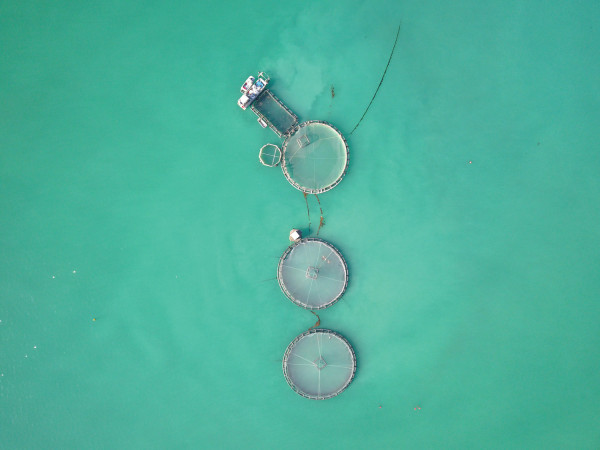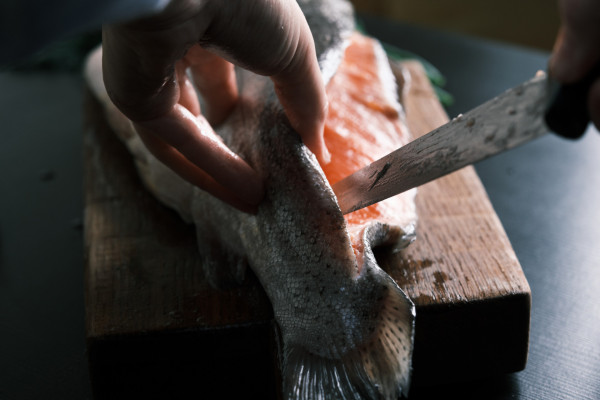Posted on 08 December 2023
Seafood Magazine: Mana, mauri, and prosperity for salmon products from Ōnuku
- 4 Minutes to read
Shared with permission from Seafood New Zealand magazine - December 2023
“Our activities are guided by the harbour as a wāhi taonga / sacred treasure. Having a benchmark that’s about restoring mauri / life-force essence brings us back to the close relationship of our ancestors with the natural world — and keeps us focused on sustaining a future for our mokopuna / future generations.” Te Rūnanga o Ōnuku
This unique Te Ao Māori way of thinking and doing business could be the secret to a gold-plated salmon industry that’s as sustainable as it is profitable.
Innovating when things are already going swimmingly, having solid relationships based on trust, and sharing information openly are also part of a plan for a quadruple bottom line for salmon from Ōnuku — a bottom line of people, place, culture, and profit.
Research from the Sustainable Seas National Science Challenge with Ōnuku Rūnanga near Akaroa has found that salmon from Ōnuku (farmed for Akaroa Salmon) has enormous potential to return even higher profits in more markets with its unique Indigenous story and values.
Research findings suggest that the unique people and processes that create salmon products in Ōnuku produce a special something about the salmon. When consumers understand what that is, they’ll likely buy more and pay more. That special something is known as a credence attribute. For Māori, this includes their comprehensive knowledge system within a Māori worldview and an unbroken connection with the marine environment.

Akaroa Salmon farm
Chair of Te Rūnanga o Ōnuku, Rik Tainui, says the work the Rūnanga had already been doing, combined with the latest research, shows what’s possible. They’d looked at potential tourism businesses and what was possible in aquaculture. Earlier research had found that people in the Rūnanga prioritised protecting the environment and taonga over jobs and profit.
“When we started these projects, for me, it was around sharing the vision of what might be possible for us if we continue down this pathway. It was around sharing our vision for restoring the mauri of our harbour, says Rik.”
Buying a stake in Akaroa Salmon was a way to do it all — enhance the mauri of people and place and be profitable and sustainable.
Lead researcher, Jay Whitehead says, ‘there’s no tension in making money and doing good. It’s this balance between the two.’
The research case study recommends focusing on product differentiation and price premiums. Other recommendations include exploring the potential to sell into new markets like Korea and Thailand, developing systems and processes to increase price premiums, targeting consumers who place importance on country of origin, and constructing and communicating an identity based on authenticity and the unique story of Ōnuku.
That unique story, says Jay, was the focus of the report for this case study. “It’s around authenticity and there's this incredible opportunity and export markets where people are looking for premium products that have a story behind them. It's just a commodity without that.”
“It's this amazing model of being super financially successful with this much bigger, broader impact on top of that. You see it in all of Ōnuku, where it's the best of new technologies and management and engineering solutions and governance, and indigenous wisdom traditions, and they're all coming together to create this new sort of approach to creating intergenerational wealth in a real sustainable way.”
“That's definitely where Māori businesses are excelling as they’re taking on the whole value chain. They’re saying, well, we want to control this product from the very beginning, right through to when it reaches the consumer and that's not the typical model for Agribusiness — and it's an incredible opportunity.”
Rik agrees, “we've been on that harbour for 800 years or so. I'm generation 26. I'm not a salmon farmer, but in my mind, we have a unique opportunity to track the whakapapa of our salmon smolt from day one to the day its fully grown and processed. We could sell the story of an Ōnuku branded salmon to the world and get a premium price for it.”

Jay adds, ‘what I'm super excited about with Ōnuku, is that they're sort of riding the wave of this innovative new model of economic development that I think is world leading in lots of ways. And we're not seeing it in the wider corporate world. I see a lot of these innovations coming out of Māori businesses and Ōnuku are sort of the exemplar of this for me.”
This work is based on timelines of 100s of years. The next steps will be about exploring multi-level aquaculture systems to get more value and increase sustainability, says Jay.
“Exploring multi trophic aquaculture systems is a massive step to being able to sell a truly high value premium product to international consumers and attract the financial returns. No product should leave New Zealand without a significant premium.
Rik says that these multi-trophic systems offer real potential for reducing nitrogen load through seaweed, mussels, or bottom feeders.
“We're a small country. We're never going to feed the world, but we can give them the very best. And we don't necessarily have to be huge to be the best.”